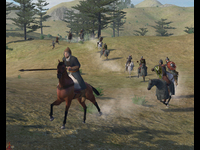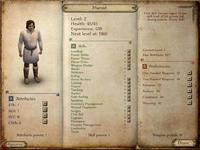|
|

|
PLATFORM
|
PC
|
BATTLE SYSTEM
|

|
INTERACTION
|

|
ORIGINALITY
|

|
STORY
|

|
MUSIC & SOUND
|

|
VISUALS
|

|
CHALLENGE
|
Adjustable
|
COMPLETION TIME
|
60-80 Hours
|
|
OVERALL

|
+ Classic, addicting sandbox gameplay
+ Choose a faction and rule castles and towns
+ Epic, real-time cavalry battles....
- ....that can be lengthy and hijack the game
- Auto-battling gives unreal results
- Generic, randomized quests could turn away some
|
Click here for scoring definitions
|
|
|
Often branded as strategy games or simulations, sandbox games featuring an open world with addicting excuses to spend dozens of hours roaming them used to be a PC staple. This type of game includes nearly anything with "tycoon" or "sim" in the title, as well as one of the highlights of PC gaming's past, Pirates!. Mount & Blade borrows the simple framework from these games, slaps a medieval setting onto it, dumps in some RPG elements such as character levels, and adds a unique stamp with a third-person, action battle system capable of supporting epic, multi-unit fights. The result is gameplay that stays basic and reiterative in an enormous, interesting world filled with tons of NPCs, towns, and villages to woo or destroy. It is fun and easy to get hooked on, but the battles could get tiresome in the hands of the wrong type of gamer.
The huge world of Mount & Blade is divided into five feudal states. A king rules each of these factions, with a few cities, several castles, and over a score of villages under his control. At each king's disposal are a couple dozen lords who rule over these fiefs. Filled with horses and humans, and lacking elves and wizards, the realistic setting perfectly matches what existed in Europe during the Dark Ages. Staying in the realm of history does the game a service, as it makes the gameplay completely intuitive. At the onset, the player's avatar is a wimpy, broke adventurer dropped into the world with no direction. By chatting it up with local leaders, one learns that by making friends and building renown it is possible to become a king's vassal and eventually his marshal, leading his faction's armies to take over enemy castles and towns.
Getting to that point, though, will take months of in-game time and well over sixty hours of real-life time. There is a marvelous sense of progression as the player goes from a nobody to someone who actually matters in a believable and organic manner. Initially, bare-chested looters armed with cleavers will hunt the player down. Expect to be talked down to by snooty nobles. Every village elder, guild leader, and lord can hand out quests when prodded, and by carefully completing them while dodging bandits, the player will gradually gain experience points and fame. Both of these increase the maximum party size, allowing the player to defeat steadily more difficult foes. Before long, kings will begin requesting the player's assistance in their war campaigns against rival factions. Going to war with a king can result in the opportunity to become a vassal and gain a fief in his kingdom. By now, bandits will likely flee from the player's party, but joining one kingdom makes new enemies; lords in opposing kingdoms will charge at and likely annihilate the player's comparatively small party of armed men. The bright side is that faction wars provide excellent sources of wealth, experience points, and infamy. After a few in-game months of taking out foes and assisting friendly lords in battle, the player can add more fiefs under his ownership and become the strongest force in the land.
Interacting with the world and the people in it over the course of the game is a treat. Mount & Blade's open-endedness plays somewhere between Pirates!'s repetitive simplicity and Oblivion's scripted, designed quests. Generic, randomized quests are repeated regularly throughout the game, but are varied enough that they take much longer to grow tedious than in other, similar games. They often involve traveling somewhere on the map, so it is easy to take on several quests at once and then complete them while tackling other tasks such as crushing bandits, sacking enemy caravans, and challenging opposing lords. Aside from the aforementioned fame and experience rewards, quests increase the player's standing with whomever benefits from their completion. This is important, as friendly villages will provide more, stronger recruits while being in lords' good graces is needed to be elected army marshal late in the game.
 Battle maps are generated based on nearby terrain.
Battle maps are generated based on nearby terrain.
|
|
Generic recruits from villages make up the primary source of additions to the party. Being nothing more than peasants with daggers, fresh recruits are worthless in battle, but gain experience and can level up to become more powerful units. Each of the five factions has a unique soldier progression tree for its citizens, with each having slightly different strengths and weaknesses at the top level. Mercenaries can be hired as well, but they are more expensive than homegrown warriors and weaker than the most powerful faction warriors. In addition to the player's character, unique NPCs called "heroes" can be met and hired in taverns. There are a set number of heroes, and the player can change their equipment and determine their statistics when they level up. Heroes can specialize in different skills so that the key party abilities, such as healing and map traversing skills, are all covered. Heroes can get upset with the leader and potentially quit if they do not approve of his actions or the company he keeps.
While the party setup, gameplay freedom, NPC interactions, and random, though varied, quests are all well-implemented, they are merely a smooth and addicting backdrop for the distinctive battle system that sets Mount & Blade apart from all other games. It is sure to attract as many people as it repels, though. Initiating a fight on the world map brings the involved parties to opposite sides of a large landscape where the members of each party duke it out in a totally real-time brawl until only one team is left standing. True to the game's title, cavalry units are emphasized here, having such a decisive advantage over infantry units as to make furnishing the party with horses a number one priority. A variety of weapons can be wielded, each with their own pros and cons. Polearms can be docked like in a joust to deal often fatal damage in a single blow. Swords can be swung at a full gallop to deal massive damage. Since the player can only control himself in battle, the AI manages everyone else, and does it rather competently. The controls are tight, but the hit detection can feel loose. From horseback, weapon swings must be executed in an unfortunately short timing window in order to slice a passing enemy rather than whiff air. The difficulty, speed, scope, and AI intelligence during battle can all be tweaked to fit the player's skill level.
 So many skills, so few skill points per hero.
So many skills, so few skill points per hero.
|
|
A talented, hands-on gamer can gallop around the battlefield, hacking and slashing away at enemy units with the support of his party. It is also possible to play as a more hands-off leader, content to hide in a corner and use a slightly awkward HUD to bark out orders to one's minions. Lastly, and least preferably, the player can choose not to join the battle at all, letting the computer crunch out some results without actually running the battle. The problem with this method is that it drastically rewards the parties' quantity over quality. When the AI plays out a fight on the field, a party of twenty knights can handily defeat fifty puny bandits without a loss. When left to the cold calculation, the knights will suffer some losses. It is reminiscent of Civilization III's "spearmen killing a tank" issue, and as a result, it is often best to join every large battle, preferably to merrily slaughter foes, but at the least to keep the battle results honest. Late in the game, massive battles can be intrusively lengthy, and being unable to skip them is frustrating and time-consuming when the
auto-battler will just turn a win into a loss.
Created by an indie developer, Mount & Blade's production values are on par with a 2005-era PC game, being significantly better than a PS2/GC/Xbox generation console game, but not at the level of the top tier 360 and PS3 titles. The visuals are clean and pretty, but not amazing. The textures are detailed and realistic, but not jaw-dropping. The positive side to this is that it runs well on old and non-gaming PCs. The background score is consistently serene, orchestral music that makes little attempt to match the action on the screen. The music is pleasant, however, and it would be swell if more RPGs would just utilize enjoyable, classical music. The sound effects are fantastically realistic. The dunks, thuds, and slices in battle could come straight from Braveheart or 300. The neighs of injured horses, screams of dying men, and painful weapon sound effects put the player right into the combat experience. Aside from battle grunts and death shrieks, there is no voice acting.
Wedging a real-time action battle system featuring swords, spears, and horses into a basic sandbox game, Mount & Blade's variety keeps it fresh and addicting for much longer than a typical straightforward strategy or simulation title. Every part of the design incorporates freedom, from the leader's skill set, to which weapon is used in battle, to which faction to join. The world is huge and open and nearly everything the player does can have an impact later, be it positive or negative. The slight gameplay alterations as the player progresses from clueless berk to king's champion make the hours fly by, and Mount & Blade stays intriguing throughout the entire process. There is no main plot, per se; becoming a king's right hand man essentially marks the highest attainable position, although the action ultimately ends when one tires of playing it. This game is perfect for anyone who enjoys sandbox games and strategy games in general. The combat could be a turn off for people with poor twitch reflexes, or those lacking the ability to aim with a mouse. A downloadable demo provides a generous amount of testing time, exposing more than enough gameplay to whet one's appetite and reveal whether or not the large-scale horse battles are a person's cup of tea. Anyone on the fence should give the demo a chance, but be warned that it crafts an engaging world that pulls the player in and does not let go.
Review Archives
|









